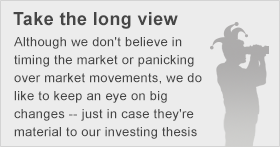
The Dow Jones Industrial Average (^DJI 0.51%) has fallen 0.7% in late trading for another rough day. As of this writing only three of 30 Dow components are in the black. With earnings season just minutes from starting with Alcoa's quarterly report, there may be some trepidation over coming numbers and new market highs.
But with such a broad sell-off on no economic or earnings news, I'd look at this as just another volatile day on Wall Street. Foolish investors who take the long-term view shouldn't get worked up and certainly shouldn't change their investment thesis today. Instead, wait for earnings to reassess your individual stocks.

Tide is one of P&G's consumer staples that never seem to lose shelf space.
Two stocks moving higher today
While the Dow is down, members Procter & Gamble (PG +1.48%) and Wal-Mart (WMT +1.23%) are 0.5% and 0.8% higher, respectively. One of the drivers is a flight to safety in companies with consistent businesses, but both also got a boost from recent news.
Procter & Gamble today announced a dividend of $0.6436 per share, continuing a 124-year run of payouts that has been highlighted by dividend increases in each of the last 58 years. When it comes to stalwart dividends few even come close to this consumer goods giant, and that'll likely continue well into the future. The company makes many consumer staples, from laundry detergent to toilet paper, and has stable shelf space in retail stores that will keep it profitable for years to come. A strong dividend is a sign of a good competitive moat and that's the hallmark of Procter & Gamble's business.
Wal-Mart is up today despite five-straight quarters of negative same-store sales in the U.S. and a number of fumbles internationally. But both MarketWatch and The Wall Street Journal posted fairly positive articles about the company today, and when the markets fall the stock is often seen as a safe haven.
But Wal-Mart's long-term trends don't look particularly rosy. In an article here I highlighted how international operating income is dropping like a rock, while here I noted that operating margin and return on investment are plummeting, as you can see below.

Source: Wal-Mart SEC filings.
In the short term, investors may see an opportunity in Wal-Mart's size and safety, but long term there have to be concerns that international stores won't return to the profits the megaretailer expects and that U.S. stores will continue to see deteriorating sales. Changing store formats may help ease the pain for a time, but retail is fundamentally changing around the world. Few if any, retailers have ever made the kind of colossal shift Wal-Mart must to make to compete against online and specialty retailers.




